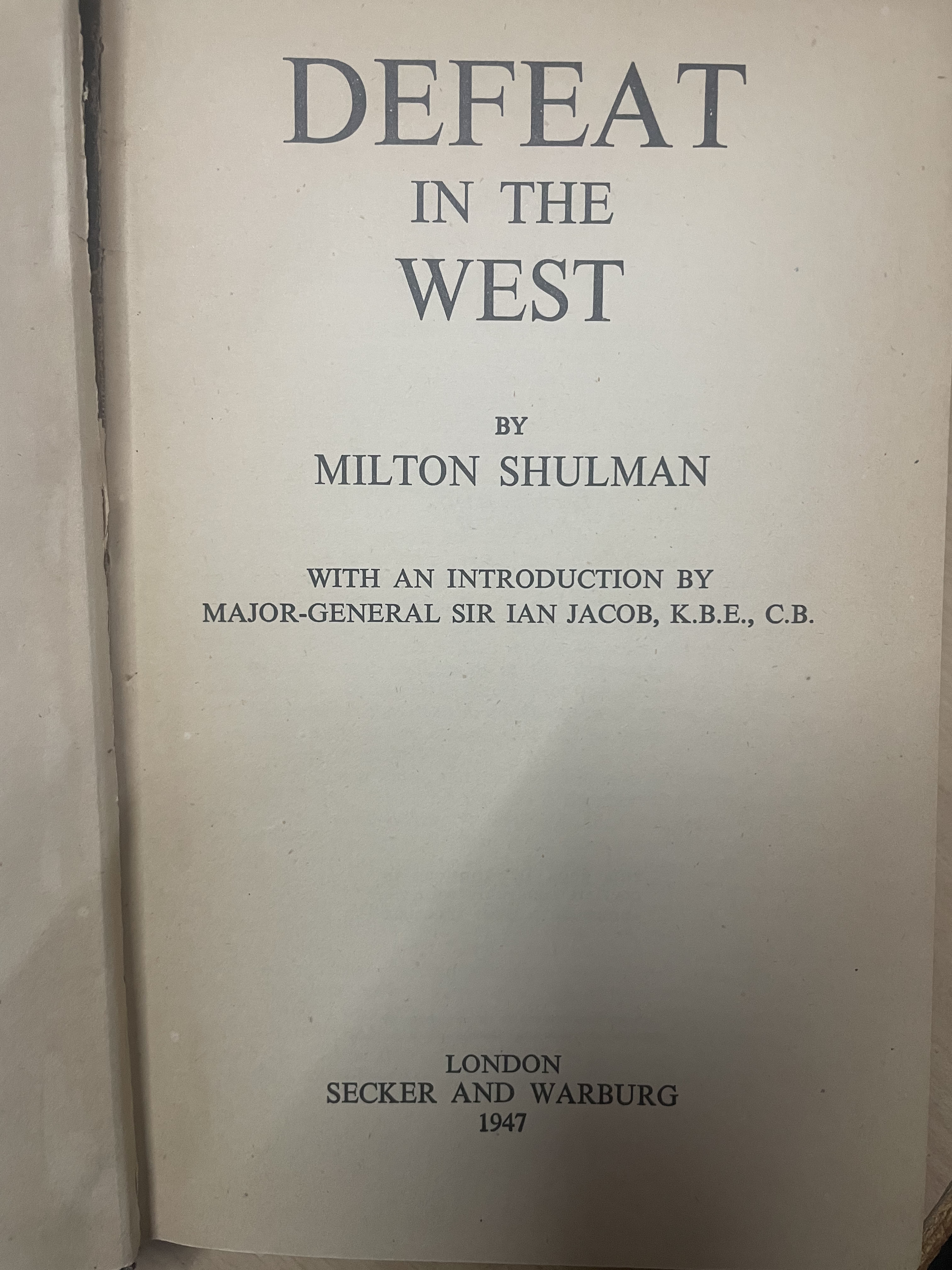Defeat In the West

About
Summary
Exquisite
TOC
Details
Related
URL
Images
Overview
Defeat in the West by Milton Shulman, initially published in 1948, delves into the reasons behind Germany's defeat in World War II, focusing on the Western Front from the 1940 invasion of France to the Allied victory in 1945. Shulman, a Canadian author, film and theatre critic, served as an intelligence officer with the First Canadian Army during the war and interviewed captured German generals, including Gerd von Rundstedt and Kurt Meyer. This book provides an in-depth analysis of the war through the eyes of the defeated German military hierarchy.Defeat in the West examines the political and military strategies employed by both the Axis and Allied powers, detailing their strengths and weaknesses. Shulman attributes Germany's loss to multiple factors, with significant emphasis on Adolf Hitler's leadership. The book analyzes major military blunders made by the German Army, such as initiating war with Russia, declaring war on the United States, and critical defeats in North Africa1. Shulman’s work relies on Anglo-American intelligence summaries (often incorporating captured German documents), records from the Nuremberg Trials, and his own interrogations of German officers.
Importance of Book
Detailed Analysis: It offers a detailed and thorough account of the reasons behind Germany’s loss in World War II.
Historical Insight: Shulman's work provides valuable insight into the strategic and tactical decisions made during the war, as well as the perspectives of key military figures.
Primary Sources: The book is based on primary source material, including interrogations of German officers and captured German documents.
Comprehensive Coverage: Defeat in the West covers the major events and battles of the Western Front, offering a comprehensive overview of the conflict.
Key Themes
Hitler's Leadership: Shulman places significant responsibility for Germany's defeat on Adolf Hitler, citing his military ineptness, refusal to heed advice, and dictatorial position.
Military Strategy and Blunders: The book analyzes critical strategic errors made by the German High Command, including opening the Eastern Front against Russia and declaring war on the United States.
Allied Victory: Shulman emphasizes the Allied powers' superior strategies and capabilities that ultimately led to Germany's defeat. However, one reviewer notes that the book tends to over-credit Allied generals while not all the blame lays at Hitler's feet.
German Military Perspective: Shulman provides insights into the war from the perspective of the defeated German military, offering a unique viewpoint on the events.
Impact of Defeat: The book explores how individuals, both great and small, react to the psychological experience of defeat.
Cultural Significance
Understanding WWII: The book contributes to a broader understanding of World War II and its impact on the world.
Military History: It remains a valuable resource for military historians and scholars interested in the strategic and tactical aspects of the war.
Historical Perspective: Defeat in the West provides a historical perspective on the events of WWII, helping readers understand the complexities and challenges of the conflict.
Lessons Learned: The book offers lessons about leadership, strategy, and the consequences of military blunders that are relevant to contemporary military and political leaders.
Effects on Society
Shaping Perceptions: The book has influenced perceptions of World War II, particularly regarding the role of Hitler and the German military.
Historical Documentation: It serves as a historical document, preserving the experiences and perspectives of those who fought in the war.
Informing Public Discourse: Defeat in the West has informed public discourse about the war, contributing to a more nuanced understanding of its causes and consequences.
Remembering the War: The book helps to ensure that the sacrifices and lessons of World War II are not forgotten.
Conclusion
Defeat in the West remains a valuable historical resource. It offers a detailed account of the war on the Western Front, providing insights into the strategies, decisions, and perspectives of those involved. Shulman's work contributes to a broader understanding of World War II and its lasting impact on the world.
Table of Content
Milton Shulman\'s \"Defeat in the West,\" published in 1947, provides a detailed analysis of the factors leading to the defeat of Germany in World War II. While I can\'t provide the exact table of contents, the book generally covers:IntroductionOverview of the central thesis and scope of the book.
Early Stages of the WarAnalysis of the initial phases of World War II and early German victories.
Strategic ErrorsExamination of key strategic mistakes made by Germany that contributed to their eventual defeat.
Military CampaignsDetailed accounts of significant military campaigns and battles.
Allied StrategiesInsight into the strategies and countermeasures employed by the Allies.
Economic and Logistical FactorsDiscussion of how economic and logistical issues affected Germany\'s war effort.
Political and Diplomatic AspectsAnalysis of the political and diplomatic dimensions that influenced the outcome of the war.
The Final StagesCoverage of the final phases of the war and the collapse of the German military.
Title
Defeat In the West
Author
Milton Shulman
Name of Publisher
Secker and warburg London
Publish Date
1947
Subject
A detailed analysis of the factors leading to the defeat of Germany in World War II
Vintage
1901-1947
Edition
First
Number of Pages
336
Category
History
Sub Category
Military
Rarity
RARE
